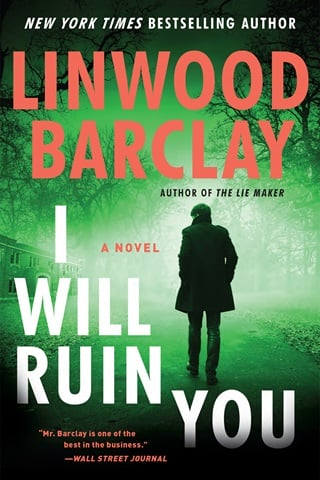Eleven
"How much longer?" the girl asked.
Her name was Allison. She was ten years old and in the fourth grade, and she was sitting in the office of Principal Bonnie Harper, who, instead of being at her desk, was in one of the two other chairs, huddling in close with the young girl so they could talk face-to-face.
"I hope not long," Bonnie said. "Your aunt lives up in Hartford, so it could take a while for her to get here. But I'll stay with you until she does, no matter how long."
Allison nodded. "Do you know why my mom didn't come home last night? I had to get ready for school all by myself today."
Bonnie certainly knew some of it. The details were sketchy, but from what her sister, Marta, who was investigating the case, had told her, Allison's mother, Cherise Fowler, had been found dead in an alley around the corner from the bar where she'd last been seen. The bartender had tried to talk her into taking a cab or an Uber home, as she'd given every indication of being high, in addition to drunk.
She waved him off and departed. Her body had been discovered shortly before noon by a sanitation crew coming through to empty trash bins.
Paramedics and police were called, but there was nothing they could do. The woman had been dead for several hours. And while the results of an autopsy were pending, Marta, who had come to the school when she learned the dead woman's daughter was a pupil here, had said she would not be surprised to learn it was a fentanyl overdose. It was the second such incident they'd seen that week, according to Marta, who told her fentanyl was fifty times stronger than heroin, a hundred times stronger than morphine. Too much of that shit and it was game over.
The only backup contact in the girl's school file was for an aunt named Louise, who lived up in Hartford. Allison's father had vanished from the scene shortly after her birth, and Cherise had been raising the child—if you could call her haphazard parenting that—on her own. Bonnie and Allison's teacher were well aware her home situation was not ideal—perilous, in fact—and they had, as they were obliged to do, notified the authorities on more than one occasion. Allison had been removed from the home a couple of times and placed locally, and last year had spent a month living up in Hartford, attending a different school, while Cherise did a stint in rehab.
Allison frequently came to school without breakfast, wearing clothes that had not been laundered in weeks. She often made her own lunch before leaving home—a peanut butter sandwich—and it had broken Bonnie's heart that she had to ask her if she could make something different in the morning, like a jam sandwich, because two of the kids in Allison's class had peanut allergies and the parents had complained.
Bonnie could remember Allison's cheerful accommodation: "Oh, okay. I can make a sandwich with marshmallow fluff."
Fortunately, the school had a breakfast program in place for less fortunate children, and the child was able to get something to eat even if nothing had been provided for her at home. Bonnie always made sure there was something left for Allison. But this was a girl who needed much more than something in her stomach. She needed a stable home environment, and that was something Bonnie could not provide.
When Allison, sitting there in the office, asked Bonnie whether she knew what had happened, why she was not able to head home like she did every other day, Bonnie was unsure how much to say.
"Your mother had a problem today, so that's why we want you to stay here until your aunt arrives."
"My aunt works till five, I think," Allison said. "It's a long drive to get here. Especially if there's traffic."
"I think maybe she's able to get off early today, so..."—Bonnie glanced at her watch—"I'm betting she'll be here within the hour."
Allison nodded thoughtfully. Then, as if asking what the weather would be like tomorrow, she said, "Is my mom dead?"
Bonnie said, "What makes you ask that, Allison?"
The girl looked at her with large, soulful eyes. "She has problems."
"I know, honey."
"I had to go live with Aunt Louise last year while she got better."
"I remember."
"Sometimes she stops taking the drugs," Allison said plainly. "But then she starts doing them again. I tell her not to but she doesn't listen to me."
"That's good advice. But sometimes people won't do what's best for themselves."
"I make dinner for her and do the dishes when she's out of it. I make good hot dogs. They're easy. I just boil them."
"That's good of you, to look after her."
Allison nodded, like you did what you had to do. "I'm scared she won't get better."
"Yeah."
"So is that what happened?"
Bonnie said, "I think that whatever your mother's situation is, it's something your aunt would want to discuss with you."
Allison considered that, then slowly shook her head from side to side. "You're the principal, so it's like you're an official person."
Bonnie leaned in closer. "You're right, Allison. Your mom... you asked if she had died. I'm afraid she has. I'm so sorry."
Allison looked away for a moment, unable to meet Bonnie's eyes.
"Even though your mother had a lot of problems, she did something pretty remarkable. She brought up a wonderful, caring young girl. Anyone who could do that is pretty special. Just like you."
Allison went very quiet. They sat there, knees almost touching, neither of them saying a word for several seconds.
"I wish there were something I could say or do to make it better," Bonnie said.
"It's okay," Allison said. "It's okay if you want to cry."
God, this kid, Bonnie thought.
 Fullepub
Fullepub 



